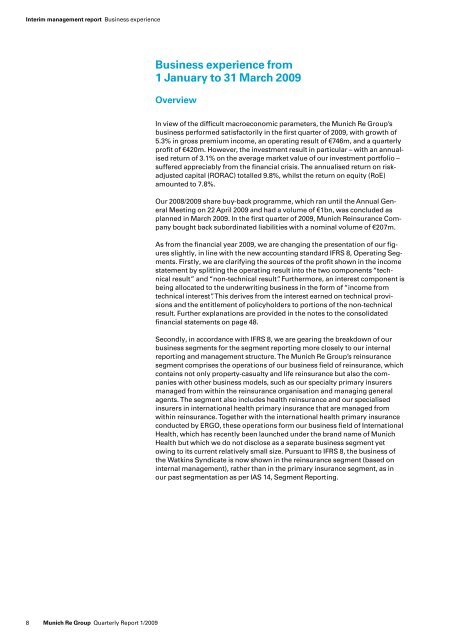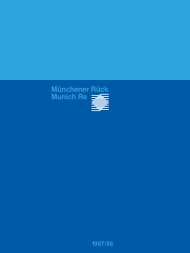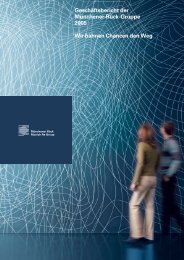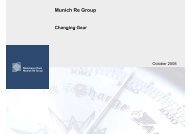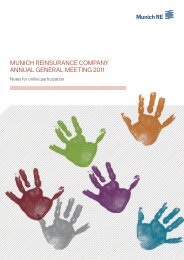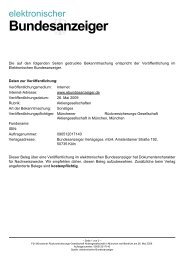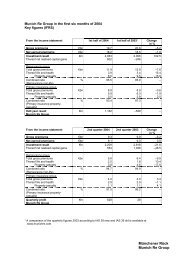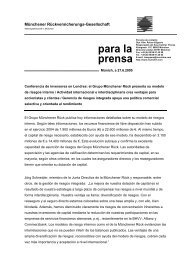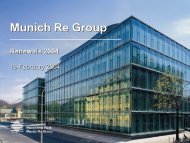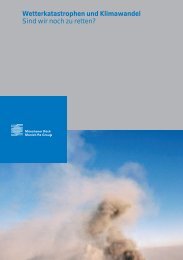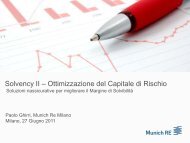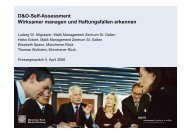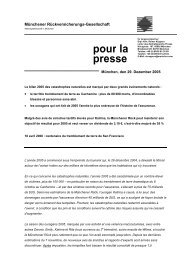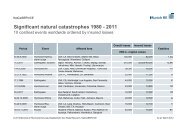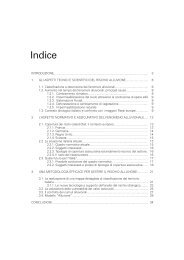Quarterly Report 1/2009 - Munich Re Group
Quarterly Report 1/2009 - Munich Re Group
Quarterly Report 1/2009 - Munich Re Group
Create successful ePaper yourself
Turn your PDF publications into a flip-book with our unique Google optimized e-Paper software.
Interim management report Business experience<br />
8 <strong>Munich</strong> <strong>Re</strong> <strong>Group</strong> <strong>Quarterly</strong> <strong><strong>Re</strong>port</strong> 1/<strong>2009</strong><br />
Business experience from<br />
1 January to 31 March <strong>2009</strong><br />
Overview<br />
In view of the difficult macroeconomic parameters, the <strong>Munich</strong> <strong>Re</strong> <strong>Group</strong>’s<br />
business performed satisfactorily in the first quarter of <strong>2009</strong>, with growth of<br />
5.3% in gross premium income, an operating result of €746m, and a quarterly<br />
profit of €420m. However, the investment result in particular – with an annualised<br />
return of 3.1% on the average market value of our investment portfolio –<br />
suffered appreciably from the financial crisis. The annualised return on riskadjusted<br />
capital (RORAC) totalled 9.8%, whilst the return on equity (RoE)<br />
amounted to 7.8%.<br />
Our 2008/<strong>2009</strong> share buy-back programme, which ran until the Annual General<br />
Meeting on 22 April <strong>2009</strong> and had a volume of €1bn, was concluded as<br />
planned in March <strong>2009</strong>. In the first quarter of <strong>2009</strong>, <strong>Munich</strong> <strong>Re</strong>insurance Company<br />
bought back subordinated liabilities with a nominal volume of €207m.<br />
As from the financial year <strong>2009</strong>, we are changing the presentation of our figures<br />
slightly, in line with the new accounting standard IFRS 8, Operating Segments.<br />
Firstly, we are clarifying the sources of the profit shown in the income<br />
statement by splitting the operating result into the two components “technical<br />
result” and “non-technical result”. Furthermore, an interest component is<br />
being allocated to the underwriting business in the form of “income from<br />
technical interest”. This derives from the interest earned on technical provisions<br />
and the entitlement of policyholders to portions of the non-technical<br />
result. Further explanations are provided in the notes to the consolidated<br />
financial statements on page 48.<br />
Secondly, in accordance with IFRS 8, we are gearing the breakdown of our<br />
business segments for the segment reporting more closely to our internal<br />
reporting and management structure. The <strong>Munich</strong> <strong>Re</strong> <strong>Group</strong>’s reinsurance<br />
segment comprises the operations of our business field of reinsurance, which<br />
contains not only property-casualty and life reinsurance but also the companies<br />
with other business models, such as our specialty primary insurers<br />
managed from within the reinsurance organisation and managing general<br />
agents. The segment also includes health reinsurance and our specialised<br />
insurers in international health primary insurance that are managed from<br />
within reinsurance. Together with the international health primary insurance<br />
conducted by ERGO, these operations form our business field of International<br />
Health, which has recently been launched under the brand name of <strong>Munich</strong><br />
Health but which we do not disclose as a separate business segment yet<br />
owing to its current relatively small size. Pursuant to IFRS 8, the business of<br />
the Watkins Syndicate is now shown in the reinsurance segment (based on<br />
internal management), rather than in the primary insurance segment, as in<br />
our past segmentation as per IAS 14, Segment <strong><strong>Re</strong>port</strong>ing.


